HP Envy 14 Spectre Ultrabook Review: Something More Than Envy
by Dustin Sklavos on August 24, 2012 10:09 PM ESTApplication and Futuremark Performance
The HP Envy 14 Spectre is capable of enjoying the fastest ultra-low voltage processor on the market as well as employing Samsung's very respectable PM830 SATA 6Gbps SSDs, and the results are impressive. It may be heavy in the hand, but the Spectre is capable of being very nimble when stressed.
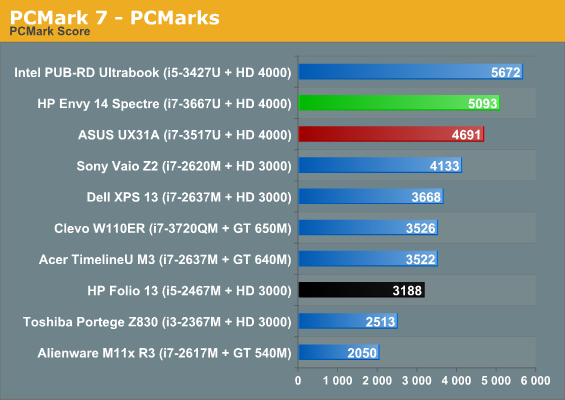
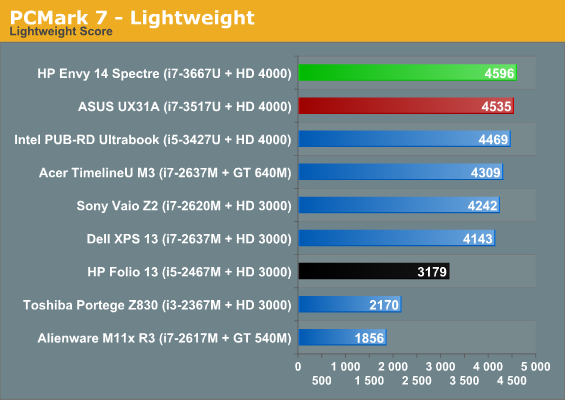
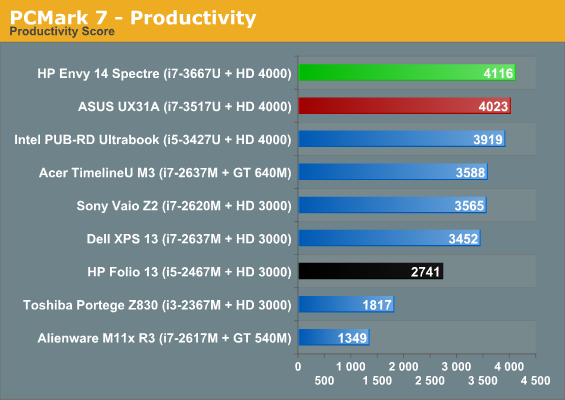
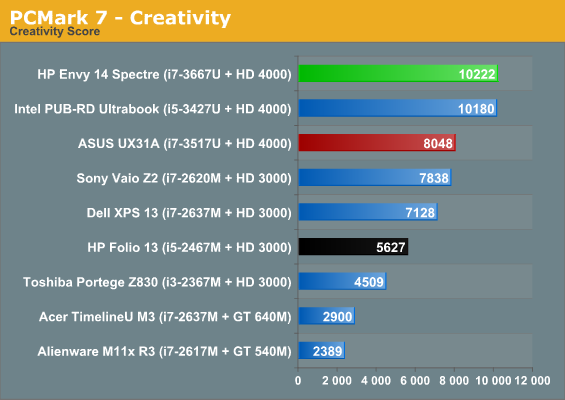
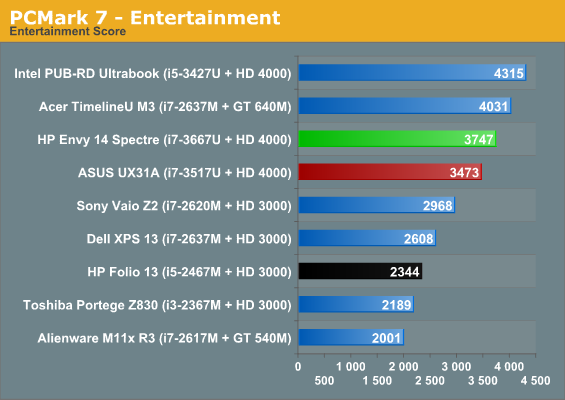
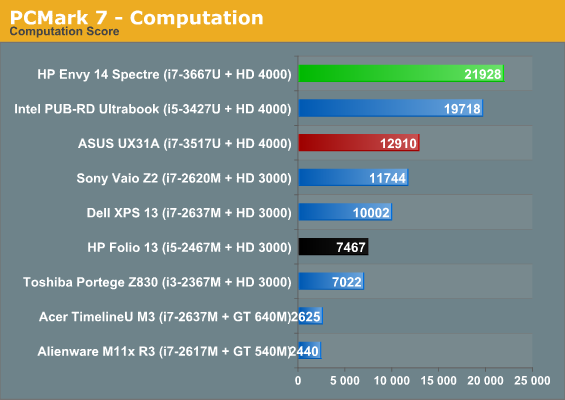
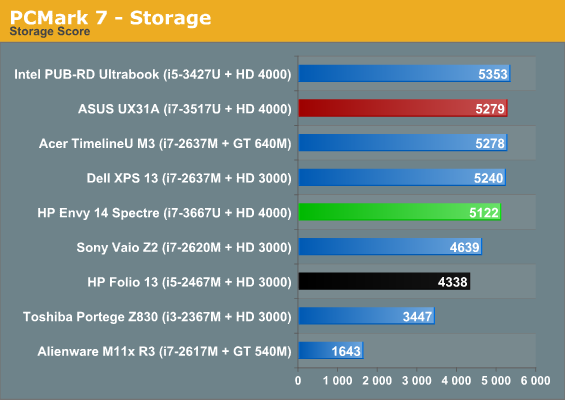
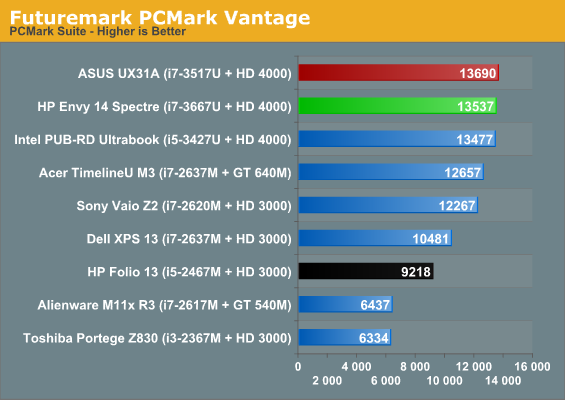
Between the SSD and fast ultra-low voltage processor, the Envy 14 Spectre ranks among the fastest ultrabooks we've tested and in many cases actually blows by the Sony Vaio Z2 and its full voltage Sandy Bridge processor. Note also that the Z2 employs a pair of SSDs in a RAID 0, so it's not terribly handicapped in this matchup.
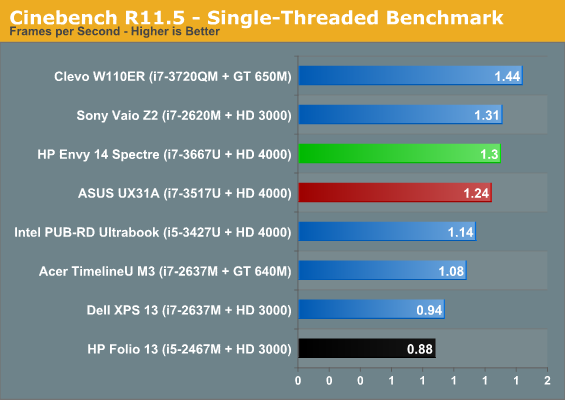
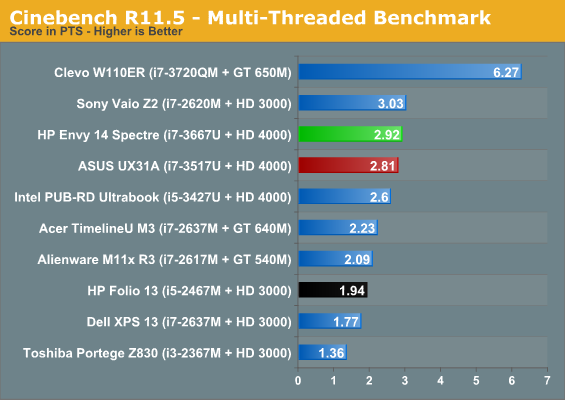
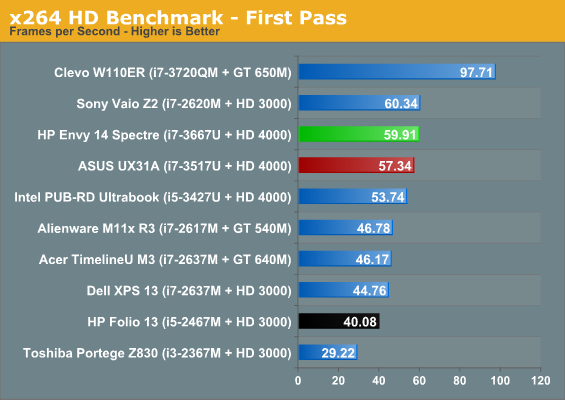
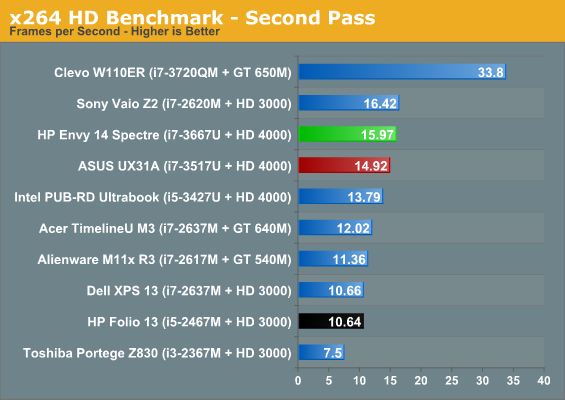
When we get to our CPU-limited benchmarks, the full scope of what Intel achieved with Ivy Bridge becomes evident: the i7-3667U is able to do in 17 watts what the last generation top end i7-2620M needed 35 watts to achieve. That's no small feat, and it's clear the Envy 14 Spectre isn't terribly hindered by its ultra-low voltage processor.
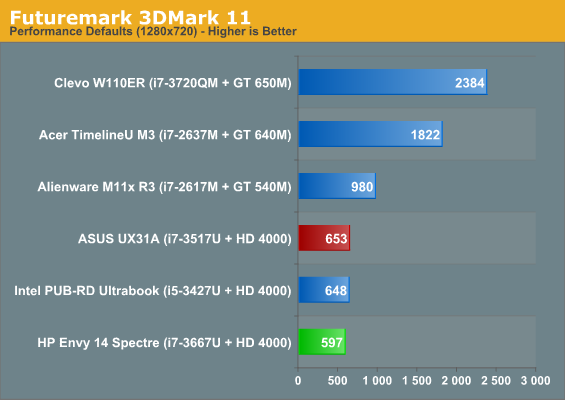
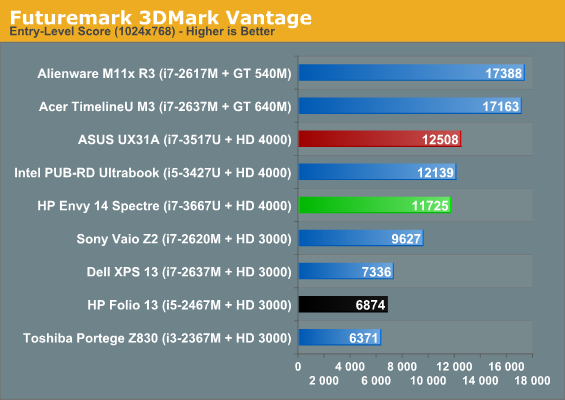
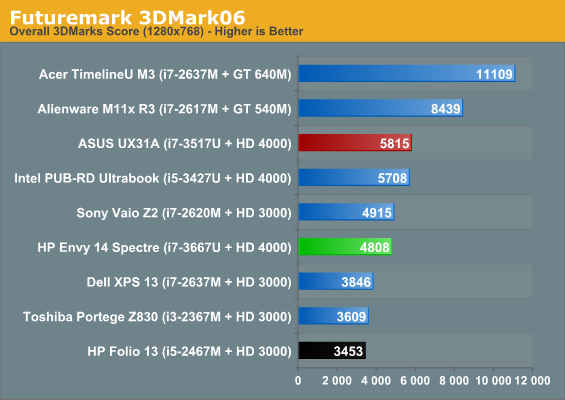
Unfortunately the 3DMarks are a bit less kind. Despite enjoying DDR3-1600, the single channel of memory bandwidth seems to noticeably hinder the HP Envy 14 Spectre. It's still baffling why HP went this route with both the Spectre and the Folio 13, but the results speak for themselves.










60 Comments
View All Comments
JarredWalton - Saturday, August 25, 2012 - link
There are only three non-Ultrabooks in the charts: the VAIO Z2 (which is practically an Ultrabook other than the CPU), and the M11x and W110ER; those two represent gaming in a smallish chassis and are worth showing just for those looking for more performance. If we didn't compare with anything other than Ultrabooks, it would be difficult for some people to put the performance into perspective.MrSpadge - Saturday, August 25, 2012 - link
Agreed - better to have a few more comparison points than having less.EnzoFX - Saturday, August 25, 2012 - link
The way I look at it, if you're going with portable, and it's going to have intel IGP, and it's going to be around 1k or more, then what's the point in not going with a Macbook Air? It'll prob be thinner and lighter, have a better battery life... etc. just overall better build quality. You can install Win if you so choose to.von Krupp - Saturday, August 25, 2012 - link
Principle is one reason. Some just really have a strong dislike for Apple, me included., and would rather not throw money their way if they can avoid doing soThe other is that when running Windows on an Apple system, you lose the benefit of marathon battery life, take a small performance hit because of Bootcamp, and have to suffer some driver quirkiness that you have no control over (track-pad usage comes to mind).
That's why.
xype - Saturday, August 25, 2012 - link
Bootcamp performance hit? How so?Penti - Saturday, August 25, 2012 - link
Bootcamp itself doesn't introduce a performance hit, it's largely driver and some BIOS-emulation layer oddities that does that. Including loosing Nvidia optimus, ACPI-support, AHCI and lots of little flaws. It means shorter battery life, worse performance. Still isn't useless though. But buy a Mac for OS X primarily as you don't get away from it even if you do run Bootcamp. If your never running it, it is largely a waste. Don't mean it's worse then another choice though even if running Win.vision33r - Monday, August 27, 2012 - link
Bootcamp is nothing more than a software script to make a NTFS partition bootable and passthru Apple's EFI Bios. That's it, there's no BIOS emulation.Any Macs running Bootcamp is the same as any PC running Windows.
If you put a sticker over the Apple badge, you'll be amazed that no other PC maker can beat Apple hardware at the same price.
Penti - Monday, August 27, 2012 - link
There is a BIOS emulation layer in the EFI firmware just like on your HP or whatever. Most UEFI computers still boot into BIOS compatibility mode. Which means it's a compatibility layer on top of UEFI that does re-implement and emulate the BIOS. It doesn't exist there by default. It doesn't have the same compatibility as a normal PC though. Bootcamp is obviously a component of it when your on a Mac to help you set it all up. Bootcamp also delivers the Windows drivers. So it's certainly something that plays a huge role. Compatibility, features and drivers do differ here, not to say it makes them bad but you certainly loose out on ACPI, Switchable graphics (Optimus) and AHCI as well as other firmware/driver stuff. The BIOS emulation it self is obviously in the EFI firmware.Jeff Bellin - Tuesday, September 4, 2012 - link
The biggest "performance" hit to the MBA running Bootcamp/Windows is in battery life. It is nearly half (4:12 according to The Verge, Endgadget) running Windows in Bootcamp vs. over 7 running OSX. This to me takes it out of the running as an Ultrabook substitute for those looking to run Windows. The general lack of driver support - especially for the trackpad, which is now worse running Windows than the best of the Windows UBs - finally - can do on their own. Still a lovely and well built machine, but not advisable if the sole/main purpose is to run Windows. The Samsung S9 and Asus UX/Zenbook series, among others, are better options as, IMO, is the Envy Spectre 14 reviewed here - even if battery life is not much better, HP is a Windows notebook supplier and drivers will be maintained - plus I'm a total sucker for the design!bji - Saturday, August 25, 2012 - link
You have no idea how ironic your post sounds to someone who lived through computing in the 90's. The idea that buying a Microsoft operating system instead of an Apple one is an act of principle is just hard to swallow.